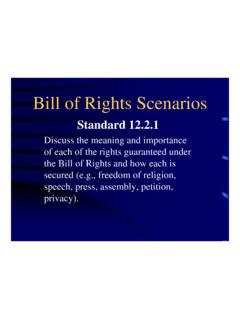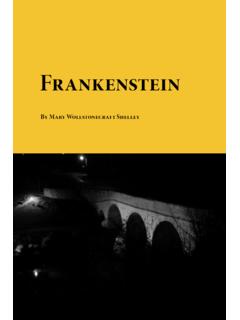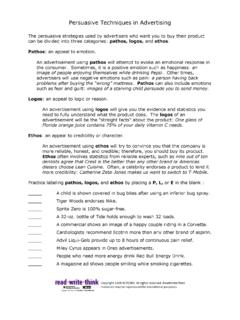Transcription of Excerpts from Three Novels of Charles Dickens - Gregg …
1 Excerpts from Three Novels of Charles Dickens Oliver Twist In Oliver Twist, Charles Dickens directs his biting sarcasm against the conditions in English workhouses and the generally deplorable treatment of the poor. Though the Poor Law Amendment Act of 1834 was an attempt to reform welfare laws and their enforcement, conditions under this law were severely hard for relief recipients. As a follow-up to this reading, students should investigate the Poor Law Amendment Act of 1834, its purpose, effect, and the bitter controversy surrounding it. In the following excerpt , the orphaned Oliver has just graduated from the parish house to the workhouse because he has become nine years old. Oliver had not been within the walls of the workhouse a quarter of an hour, and had scarcely completed the demolition of a second slice of bread, when Mr. Bumble, who had handed him over to the care of an old woman, returned, and, telling him it was a board night, informed him that the board had said he was to appear before it forthwith.
2 Not having a very clearly defined notion of what a live board was, Oliver was rather astounded by this intelligence, and was not quite certain whether he ought to laugh or cry. He had no time to think about the matter, however; for Mr. Bumble gave him a tap on the head to wake him up, and another on the back to make him lively, and bidding him follow, conducted him into a large whitewashed room where eight or ten fat gentlemen were sitting round a table, at the top of which, seated in an armchair rather higher than the rest, was a particularly fat gentleman with a very round, red face. "Bow to the Board," said Bumble. Oliver brushed away two or Three tears that were lingering in his eyes, and seeing no board but the table, fortunately bowed to that. "What's your name, boy?" said the gentleman in the high chair. Oliver was frightened at the sight of so many gentlemen, which made him tremble; and the beadle gave him another tap behind, which made him cry; and these two causes made him answer in a very low and hesitating voice; whereupon a gentleman in a white waistcoat said he was a fool.
3 Which was a capital way of raising his spirits, and putting him quite at ease. "Boy," said the gentleman in the high chair, "listen to me. You know you're an orphan, I suppose?" "What's that, sir?" inquired poor Oliver. "The boy is a fool I thought he was," said the gentleman in the white waistcoat, in a very decided tone. If one member of a class be blessed with an intuitive perception of others of the same race, the gentleman in the white waistcoat was unquestionably well qualified to pronounce an opinion on the matter. "Hush!" said the gentleman who had spoken first. "You know you've got no father or mother, and that you were brought up by the parish, don't you?" "Yes, sir," replied Oliver, weeping bitterly. "I hope you say your prayers every night." said another gentleman in a gruff voice; "and pray for the people who feed you, and take care of you like a Christian.
4 " "Yes, sir," stammered the boy. The gentleman who spoke last was unconsciously right. It would have been very like a Christian, and a marvelously good Christian, too, if Oliver had prayed for the people who fed and took care of h im . But he hadn't, because nobody had taught him. "Well! You have come here to be educated, and taught a useful trade," said the red-faced gentleman in the high chair. "So you'll begin to pick oakum tomorrow morning at six o'clock," added the surly one in the white waistcoat. For the combination of both these blessings in the one simple process of picking oakum, Oliver bowed low by the direction of the beadle, and was then hurried away to a large ward, where, on a rough, hard bed, he sobbed himself to sleep. What a noble illustration of the tender laws of this favoured country! They let the paupers go to sleep! The room in which the boys were fed, was a large stone hall, with a copper at one end, out of which the master, dressed in an apron for the purpose, and assisted by one or two women, ladled the gruel at mealtimes.
5 Of which composition each boy had one porringer, and no more except on occasions of great public rejoicing, when he had two ounces and a quarter of bread besides. The bowls never wanted washing. The boys polished them with their spoons til they shown again; and when they had performed this operation (which never took very long, the spoons being nearly as large as the bowls), they would sit staring at the copper with such eager eyes as if they could have devoured the very bricks of which it was composed; employing themselves, meanwhile, in sucking their fingers most assiduously, with the view of catching up any stray splashes of gruel that might have been cast thereon. Boys have generally excellent appetites. Oliver Twist and his companions suffered the tortures of slow starvation for Three months: at last they got so voracious and wild with hunger, that one boy, who was tall for his age, and hadn't been used to that sort of thing (for his father had kept a small cookshop), hinted darkly to his companions, that unless he had another basin of gruel per diem, he was afraid he might some night happen to eat the boy who slept next to him, who happened to be a weakly youth of tender age.
6 He had a wild, hungry eye; and they implicitly believed him. A council was held; lots were cast who should walk up to the master after supper that evening, and ask for more; and it fell to Oliver Twist. The evening arrived; the boys took their places. The master, in his cook's uniform, stationed himself at the copper, his pauper assistants arranged themselves behind him; the gruel was served out; and a long grace was said over the short commons. The gruel disappeared; the boys whispered to each other, and winked at Oliver; while his next neighbors nudged him. Child as he was, he was desperate with hunger, and reckless with misery. He rose from the table, and advancing to the master, basin and spoon in hand, said, somewhat alarmed at his own temerity: "Please, sir, I want some more." The master was a fat, healthy man; but he turned very pale. He gazed in stupefied astonishment on the small rebel for some seconds, and then clung for support to the copper.
7 The assistants were paralyzed with wonder; the boys with fear. "What!" said the master at length, in a faint voice. "Please, sir," replied Oliver. "I want some more." The master aimed a blow at Oliver's head with the ladle; pinioned him in his arms; shrieked aloud for the beadle. The Board were sitting in solemn conclave, when Mr. Bumble rushed into the room in great excitement, and addressing the gentleman in the high chair, said: "Mr. Limbkins, I beg your pardon, sir! Oliver Twist has asked for more!" There was a general start. Horror was depicted on every countenance. "For more!" said Mr. Limbkins, "Compose yourself, Bumble, and answer me distinctly. Do I understand that he asked for more, after he had eaten the supper allotted by the dietary?" "He did, sir," replied Bumble. "That boy will be hung," said the gentleman in the white waistcoat; "I know that boy will be hung.
8 " Nobody controverted the prophetic gentleman's opinion. An animated discussion took place. Oliver was ordered into instant confinement; and a bill was next morning pasted on the outside of the gate, offering a reward of five pounds to anybody who would take Oliver Twist off the hands of the parish. In other words, five pounds and Oliver Twist were offered to any man or woman who wanted an apprentice to any trade, business, or calling. "I never was more convinced of anything in my life," said the gentleman in the white waistcoat, as he knocked at the gate and read the bill next morning: "I never was more convinced of anything in my life, than I am that that boy will come to be hung." As I purpose to show in the sequel whether the white-waistcoated gentleman was right or not, I should perhaps mar the interest of this narrative (supposing it to possess any at all), if I ventured to hint just yet, whether the life of Oliver Twist had this violent termination or no.
9 Hard Times Dickens was not only disturbed by poverty and inferior working conditions but he was also deeply concerned about education. Illiteracy in the lower classes was, in Dickens 's estimation, one of the key factors contributing to the social evils of the times. In Novels , speeches, and periodicals he attacked England's inadequate education system. In Household Words, a magazine partially owned by Dickens , he wrote: "I saw a Minister of State, sitting in his closet; and round about him, rising from the country which he governed, up to the Eternal Heavens, was a low dull Howl of Ignorance.. I saw 30,000 children hunted, flogged, imprisoned, but not taught, all joined in this cry.. The Minister said, Hearken to this cry. What shall we do to stay (stop) it?' But in the end, the Minister shrugged his shoulder and replied, It is a great wrong, but it will last many a time.
10 ' "Seven years later Dickens said in a speech: "I don't like that sort of school ..where the bright childish imagination is utterly discouraged .. where I have never seen among the pupils, whether boys or girls, anything but little parrots and small calculating machines." This image of children as "little parrots and small calculating machines" is greatly expanded upon in the following excerpt from Dickens 's novel Hard Times, published in 1854. The fanatical Mr. Gradgrind has become a symbol of the dogmatic dryasdust who turns factual knowledge into an obsession. By the end of the novel , Gradgrind realizes how his ideas have blighted his children's lives. "Now, what I want is Facts. Teach these boys and girls nothing but Facts. Facts alone are wanted in life. Plant nothing else, and root out everything else. You can only form the minds of reasoning animals upon Facts; nothing else will ever be of any service to them.











